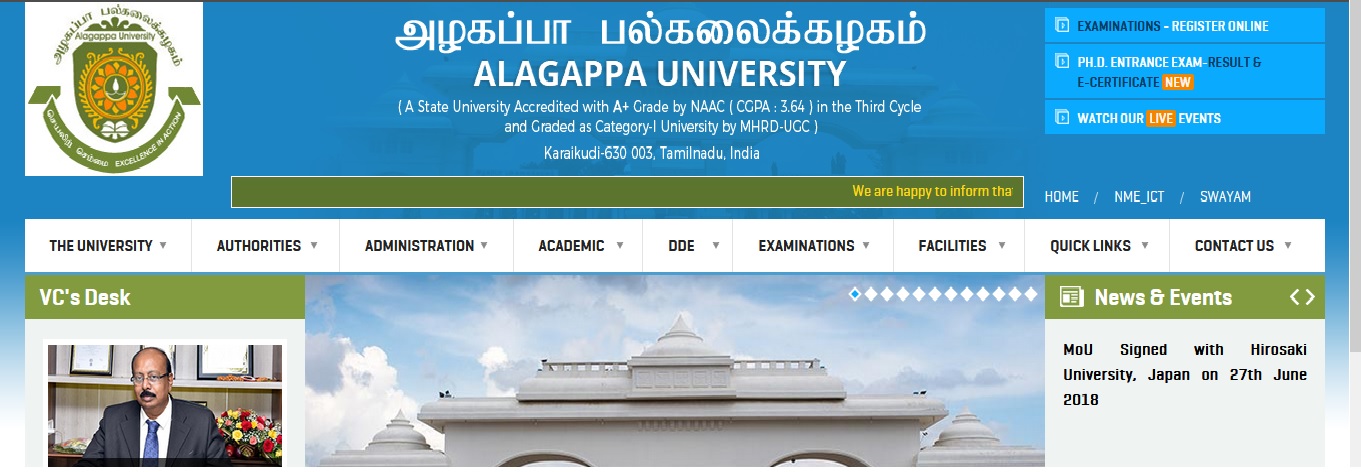Advanced Educational Psychology M.Ed Model Question Papers : alagappauniversity.ac.in
Name of the University : Alagappa University
Degree : M.Ed
Department : Education
Subject Code/Name : Advanced Educational Psychology
Document Type : Model Question Papers
Website : alagappauniversity.ac.in
Download Model/Sample Question Paper : APRIL 2011 :https://www.pdfquestion.in/uploads/alagappauniversity.ac.in/4158.-1-M.Ed.,.pdf
Alagappa Educational Psychology Question Paper
M.Ed. DEGREE EXAMINATION, APRIL 2011
Time : 3 Hours
Maximum : 75 Marks
(10 × 2 = 20)
Related : Alagappa University Psychology Of The Learner-I B.Ed Model Question Papers : www.pdfquestion.in/4127.html
Part A
Answer all questions. Each question carries two marks.
1. When is the clinical method used most?
2. Define the nature of educational psychology.
3. State the law of Regression?
4. Can a good foster home overcome the deficiencies caused by poor heredity of the foster child?
5. What is self-actualisation?
6. What do yon mean by intrinsic motivation?
7. What is Retroactive inhibition?
8. What is memory?
9. What are the aims of mental hygiene?
10. What do you mean by guidance?

Part B
(5 × 5 = 25)
Answer all questions not exceeding 250 words each. Each question carries five marks.
11. (a) Which method would you use in studying the behaviour of your students in the classroom or in the playground? Why? (Or)
(b) Why should the study of psychology be essential to a teacher?
12. (a) Explain the social development of the adolescents. (Or)
(b) What are the important factors that affect the process of development?
13. (a) How can you provide achievement motivation to your students? (Or)
(b) Define a concept. What are the various levels of concept formation?
14. (a) How can you identify the creative students in your class and foster them? (Or)
(b) What is the relationship between learning and memory.
15. (a) What are the characteristics of a mentally healthy person? (Or)
(b) Explain the steps for Directive counselling.
Part C
(3 × 10 = 30)
Answer any three of the following in not exceeding 600 words each. Each question carries ten marks.
16. Describe the role of genetic method in psychology.
17. What is adolescence? Discuss the stress and strains experienced by a’dolescents? How can the teacher help adolescents to overcome these difficulties?
18. Describe Piaget’s theory of cognitive development.
19. Describe the steps for solving problems.
20. Describe the determinants of personality of the individuals.
April 2011
M.Ed. Degree Examination :
Integration Of Technology In Education : (CBCS—2008 onwards)
Time : 3 Hours
Maximum : 75 Marks
Part A : (10 × 2 = 20)
Answer all questions. All questions carry equal marks
1. Explain the meaning of Technology Integration.
2. How can you say that learning as a generative process?
3. What do you mean by constructivist approach?
4. Explain resource characteristics in an instructional design.
5. What are the characteristics of smart classrooms?
6. What do you mean by web quests ?
7. What are the uses of interactive whiteboards ?
8. How will you create virtual laboartory ?
9. What do you mean by behavioural approach ?
10. What do you mean by Technology based learning ?
Part B : (5 × 5 = 25)
Answer all questions. Choosing either (a) or (b) All questions carry equal marks
11. (a) Explain the need for technology education linkage. (Or)
(b) What is the difference between Traditional and Behavioural approaches ?
12. (a) Explain the role of teacher in constructivist approach. (Or)
(b) What are the components of kemp instructional development model?
13. (a) Explain the special features of Cyber Hunt. (Or)
(b) Explain Delphi technique for Technology.
14. (a) Explain Teacher Characteristics in the instructional design process. (Or)
(b) Explai the application of UNESCO ISD model.
15. (a) Explain Instructional Media selection and its effectiveness. (Or)
(b) Explain the advantages of Virtual Laboratory.
Part C : (3 × 10 = 30)
Answer any three questions
All questions carry equal marks
16. Explain in detail the advantages of Technology Revolution in Education.
17. Explain any two learning approaches and their application in the held of Education.
18. How will you plan for an instructional design? Explain instructional development institute model and its application.
19. What are the steps involved in the selection and Evaluation of Instructional materials and media?
20. What do you mean by diffusion of Technology innovation? Explain with the help of suitable illustration.